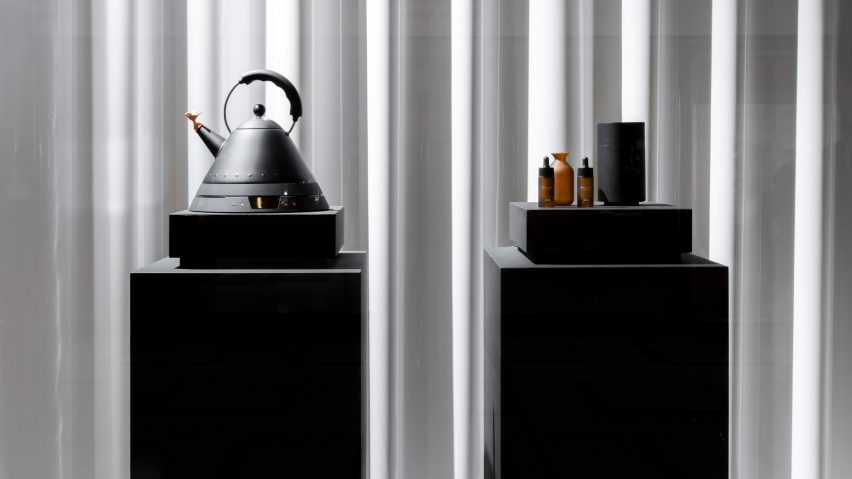Italian design brand Alessi has marked its centenary year with a Milan design week show where special-edition products are presented in settings that include a staircase covered in toilet rolls and a curling pitch.
Staged inside Milan's Galleria Manzoni, the Alessi 100 – 001 exhibition celebrates the values that have come to define the brand over its 100-year history.
In the 12 months leading up to the exhibition, Alessi released a series of limited-edition products that draw on its rich history. These include alternative versions of classic designs and never-seen-before prototypes.
These products are presented across 12 rooms, curated in collaboration with AMDL Circle, with each one representing a key Alessi brand value.
Company director Alberto Alessi told Dezeen that these values have been shaped by the innovative nature of the designers Alessi has worked with over the years, such as Michael Graves, Ettore Sottsass and Alessandro Mendini.
"At Alessi, we consider ourselves as a design research lab," he said. "I have worked with more than 300 designers in my life and every one of them has left an imprint into the Alessi practice that is humanistic, artistic or poetic."
"Over time, these imprints became more clear," Alessi continued. "Step by step, they became the values of Alessi, not because of a plan but by nature."
The 12 values represented in the exhibition are: Industrial Craftsmanship, Art, Paradox, Beyond, Hybridisation, Research Lab, Irony, Borderline, Poetry, Thingness, Transgression and Futurespective.
The Borderline room references Alessi's ambition to push the boundaries of design, as demonstrated by Philippe Starck's iconic 1988 Juicy Salif lemon squeezer.
Alessi produced an early prototype of this design for the Alessi Values collection.
"With Philippe Stark, it was clear that his attempt was to reach the borderline every time," said Alberto. "It wasn't okay for him to do something similar to what already existed."
Trangression sees a range of Alessi products hybridised with everyday objects – with mirrors slotted in between – as a means of comparison. Among them is the 1991 Aldo Rossi-designed cooking pot, La Cubica.
Alberto highlighted this as one of his favourite objects in the exhibition, as it broke the rules with its square shape, yet has a classic feel. "It is so absolute," he said.
The toilet-roll-filled room is Paradox, which aims to elevate objects above their station. It featured a gold version of Stefano Giovannoni's 1992 Merdolino toilet brush.
The curling pitch features in the Irony room, accompanied by the previously unseen Bulbul kettle designed by Achille Castiglione in 1995, while the Thingness room centres around the unreleased Faralla nutcracker by Enzo Mari.
The Industrial Craftsmanship and Poetry rooms both have a performative quality, while the Research Lab displays more than 30 different coffee makers and pots from the archive, including some never put into production.
Alberto told Dezeen he had "stolen" a few pieces from the archives over the years for his own use. "I have a passion for prototypes," he said.
He revealed that the coffee maker he uses himself is the Pulcina designed by Michele de Lucchi in 2015.
The exhibition also includes a section dedicated to the brand's early years, from the 20s to the 60s, and a room where Alessi is launching its latest project, the Occasional Object cutlery designed by the late Virgil Abloh.
The exhibition title, Alessi 100 – 001, alluded to the idea of looking back as a way of looking forward. For Alberto, it also creates a moment to celebrate the 52 years he has spent at the company's helm.
He told Dezeen that he hopes the younger generations of the Alessi family will continue driving the company in the same direction, but that nothing is certain.
"I've done my part," he told Dezeen. "But I've never been interested nor able to plan the future. I like to face the future step by step, and discover new, exciting ideas wherever possible."
Alessi 100-001 is on show at Galleria Manzoni in Milan from 7 to 26 June , coinciding with Milan design week 2022 and Milan Fashion Week's menswear edition. See our Milan design week 2022 guide on Dezeen Events Guide for information about other exhibitions, installations and talks that took place.

